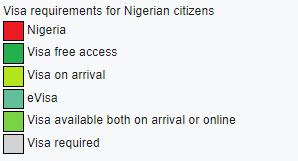The Nigeria Border Crossing
- Nigeria has the largest road network in West Africa. According to the Government Infrastructure Concession Regulatory Commission, Nigeria has about 195,000 km of road network of which about 60,000 km are paved (2019).
- Most of the major road networks were constructed in the 80s and early 90s. As a result of poor maintenance and low-quality materials used for repairs, the condition of roads is deteriorating. Travelling is very difficult, and sometimes almost impossible in many areas on secondary roads during the raining season due to potholes and eroded, uneven surfaces.
- Nigeria’s most important highways run from South to North and were designed to bring produce from the hinterlands to the coast for export and to link the economies of old Northern and Southern Nigeria. These highways are labelled the A1, A2, A3 and A4. All other major roads in the country originate from these four.
- In its 2018 budget the Government allocated N295 billion ($ 819mil) for road capital works and maintenance so there are ongoing programs to upgrade and maintain these main thoroughfares.
- There is a high level of insecurity on Nigerian roads once outside metropolitan areas, with many reports of armed criminals stopping travellers resulting in robbery and kidnappings. The risk is particularly high after dark and on secondary roads where traffic is forced to slow down as a result of poor surface conditions.
- Local risk status should be checked with trusted official security forces before attempting road travel and armed escorts are required in many areas as a result of criminal activity.
- There is a constant risk of collision as a result of poor road conditions and repair works that result in traffic changing lanes without warning and turning single lane expressways into 2-way traffic at any time.
- Numerous police checkpoints can add considerably to travel times and all documentation relating to vehicles and passengers should be in order and carried to avoid further delays at these checkpoints.
- Nigeria Visa requires you to apply within 14 days of your intended date of arrival. And also the eVisa has a 14 days validation only. So, However, you can apply with us at any time, as we will automatically queue your order until it's the right time to process your application.
Nigeria Road Security
What is vaccine required to travel Nigeria?
Which country is visa free to Nigeria?


When should I apply to Nigeria eVisa?
Traveling to Nigeria
Traveling to Nigeria can be an exciting experience, as the country is rich in culture, diverse landscapes, and vibrant cities. However, it's important to be well-prepared for your trip. Here are some general tips for traveling to Nigeria:
When visiting Nigeria national parks When visiting these national parks, it's important to adhere to park regulations, engage in responsible tourism practices, and consider hiring local guides for a more enriching experience. Additionally, be mindful of the current safety and security conditions in the regions surrounding the parks.
Nigeria Visa Requirements
Visas are required for foreign citizens traveling to Nigeria. Foreign nationals may apply for a visa online in advance of travel. Applicants may complete the e-visa application form and make payment online with a credit card or bank transfer Nigeria online visa page and Visa Requirements





 |
|  |
|  |
|  |
| 